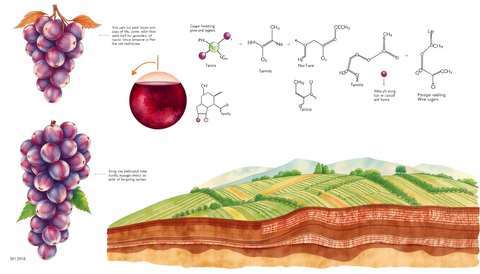As you step through the doors of McLaren Vale Cellars, the air is thick with the aroma of oak-aged Cabernet Sauvignon and the crisp, mineral notes of a freshly uncorked Chardonnay. This is the heart of South Australia's renowned McLaren Vale wine region, where the unique interplay of climate and soil has given birth to some of the country's most celebrated vintages.
The Influence of Climate
The McLaren Vale region enjoys a Mediterranean climate, with warm, dry summers and mild, wet winters. This climate is a key factor in shaping the character of the wines produced here. The long, sunny days allow the grapes to develop intense flavors and robust tannins, while the cooling ocean breezes help to preserve the grapes' natural acidity.
The Role of Temperature
The average daily temperature in McLaren Vale during the growing season ranges from around 20°C to 30°C, with occasional heat spikes reaching the mid-30s. This temperature range is ideal for many grape varieties, allowing them to fully ripen without becoming overripe or losing their freshness.
The diurnal temperature variation – the difference between daytime and nighttime temperatures – is also crucial. The cool nights help to retain the grapes' natural acidity, while the warm days facilitate the development of complex flavors and aromas.
The Importance of Rainfall
Rainfall patterns in McLaren Vale are equally important. The region experiences a Mediterranean-style rainfall pattern, with the majority of the annual precipitation falling during the winter months. This ensures that the vines have access to sufficient moisture during the critical growing season, without being waterlogged.
The low rainfall during the summer months also helps to control vigor, preventing the vines from becoming overly lush and producing diluted, watery grapes. This natural stress on the vines encourages them to focus their energy on producing fewer, but more concentrated, berries.
The Impact of Soil
The soil composition in McLaren Vale is as diverse as the wines it produces. The region is known for its complex, varied terroir, with a range of soil types that include ancient seabeds, alluvial fans, and weathered rock formations.
Limestone and Calcareous Soils
One of the defining features of the McLaren Vale terroir is the presence of limestone and calcareous soils. These soils are rich in calcium carbonate, which helps to buffer the natural acidity of the grapes and imparts a distinctive minerality to the wines.
Vineyards planted on these soils tend to produce wines with a crisp, elegant mouthfeel and a pronounced sense of place. Chardonnay and Riesling, in particular, thrive in these conditions, showcasing their inherent freshness and complexity.
Alluvial and Loamy Soils
In contrast, the alluvial and loamy soils found in other parts of the region are known for their ability to produce wines with a more generous, fruit-forward character. These soils are typically richer in organic matter and nutrients, which can lead to more vigorous vine growth and larger, more opulent grape clusters.
Varietals like Shiraz and Cabernet Sauvignon often excel in these soil types, developing deep, concentrated flavors and a supple, velvety texture. The wines from these vineyards tend to be more approachable in their youth, with a lush, generous mouthfeel.
The Influence of Geology
The geological history of the McLaren Vale region has also played a significant role in shaping the local terroir. The area is characterized by a complex mix of ancient seabeds, weathered rock formations, and alluvial deposits, each of which imparts its own unique set of characteristics to the wines.
For example, vineyards planted on the region's ancient shale and slate soils tend to produce wines with a pronounced minerality and a firm, structured mouthfeel. These soils are often associated with Cabernet Sauvignon and Grenache, which thrive in the well-drained, low-vigor conditions.
The Interplay of Climate and Soil
The interplay between climate and soil is what truly sets the wines of McLaren Vale apart. The region's Mediterranean climate, with its warm days and cool nights, provides the perfect growing conditions for a wide range of grape varieties. But it is the diverse and complex terroir that gives each wine its unique signature.
Winemakers in the region have long recognized the importance of understanding and respecting the nuances of their local terroir. By carefully matching grape varieties to the most suitable soil types and microclimates, they are able to coax out the full potential of the fruit, creating wines that are a true reflection of their place of origin.
Whether it's the crisp, mineral-driven Chardonnays from the limestone-rich vineyards or the rich, velvety Shiraz from the alluvial soils, the wines of McLaren Vale are a testament to the power of the natural world to shape the flavors we enjoy in our glass. As you explore the offerings at McLaren Vale Cellars, you'll be embarking on a journey through one of the most fascinating and diverse wine regions in the world.
Conclusion
The wines of McLaren Vale are the result of a delicate balance between climate and soil, a harmonious interplay that has been honed over centuries of winemaking. From the cool, coastal vineyards to the sun-drenched inland slopes, each bottle tells a story of the unique terroir that gave it life.
As you savor the flavors of a McLaren Vale vintage, take a moment to appreciate the natural forces that have conspired to create such a remarkable expression of place. Whether you're enjoying a crisp, mineral-driven Chardonnay or a rich, velvety Shiraz, you're tasting the essence of this remarkable wine region – a true reflection of the land and the climate that have shaped it.




Comments (0)
There are no comments for this article. Be the first one to leave a message!